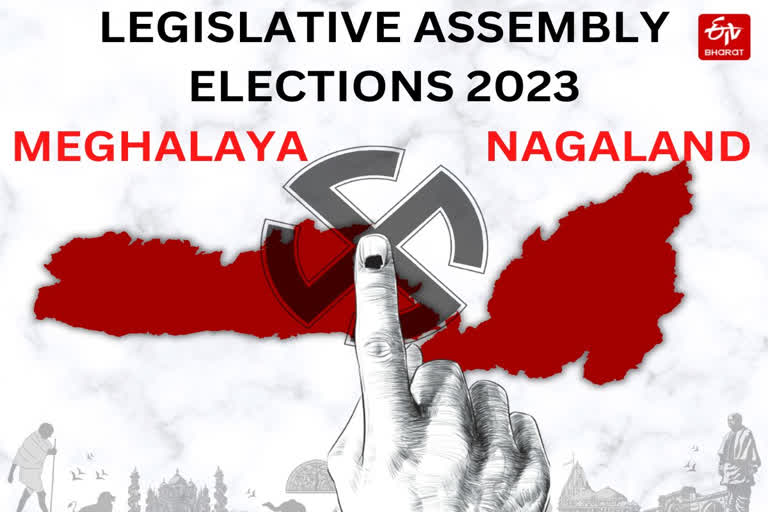Hyderabad:Nagaland and Meghalaya, two of the eight northeastern states, are going to polls on Monday, February 27. The counting for the two states and Tripura, which went to polls on February 16 and recorded a healthy turnout of 90%, will occur on March 2. The high-decibel campaigns for the elections to the 59 assembly seats in Meghalaya and an equal number in Nagaland ended on Saturday.
In both these states, the last elections threw hung assemblies but the BJP managed to wriggle its way into the government settling on playing a second fiddle. While the prospect this time around remains the same, the saffron party would not mind adding more seats to its tally.
Meghalaya: NPP, BJP and the tale of two Sangmas
Interestingly in the last polls in Meghalaya, the Mukul Sanmga-led Congress government came out as the single largest party winning 21 seats while BJP bagged two, its first-ever taste of success in the Christian-majority state.
However, the saffron party, courtesy of a friendly governor at the Raj Bhavan, got ample time to stitch an alliance with the Nationalist People’s Party (NPP) that had won 19 seats and other regional parties including the United Democratic Front (UDF), People’s Democratic Front (PDP) and Hill State People’s Democratic Party (HSPDP) and reach the magic number of 31 to form the government.
A few months after the new government came to power in Meghalaya, the BJP-led central government removed AFSPA from the northeastern state after 27 years. While all seemed hunky dory initially, the ties between the BJP and NPP took a turn for the worst as the latter felt the saffron party was trying to be much more than just a small ally.
In July 2022, BJP's state vice president Bernard Marak from Tura town, the same place CM Sangma comes from, was arrested for allegedly running a brothel in the Garo hills. This was the lowest point of the relations between the NPP and the BJP. NPP was feeling insecure particularly because BJP had given all the support to Marak to strengthen the party in Garo hills which has 24 seats, speaking volumes about the saffron party's rising ambitions in the northeastern state where it has been able to scratch the political surface.
Amid this, the state BJP leaders last year accused NPP of 'misrule' and even sought withdrawal of support. However, the party's leadership in New Delhi decided otherwise knowing that it was too early to attempt any such adventure in the state where it is still fledgling.
This time around, each party is seeking votes wary of not carrying the other's baggage. NPP, especially, would not want to be tagged as the pro-Hindutva party in a state which has 75% Christians and where consuming beef is "lifestyle" if one was to quote Ernest Mawrie, the BJP state chief who on February 23 said everybody including him ate beef.
As for the Congress, its chances aren't as bright this time as they were in 2018. Mukul Sangma, once its star leader, has parted ways and now represents the All India Trinamool Congress (AITC). The chances of Mukul's AITC shaking hands with Conrad are bleak since that raises the question of who would part ways with the Chief Minister's seat given how the success of the two Sangmas has been determined by each other's political failures.
Nagaland: BJP's attempt to gain more foothold
Just like in Meghalaya, in Nagaland too, the single largest party could not be a part of the government formed after the last polls. The Naga People’s Front (NPF) won 26 seats with a vote share of nearly 39 per cent, however, it was a relatively new Nationalist Democratic Progressive Party (NDPP) that managed to win 17 seats and stitch an alliance with the BJP which had won 12.
The NDPP was formed by NPF rebels who supported Neiphiu Rio, the current Chief Minister of Nagaland and split to form the Democratic Progressive Party. In October 2017, the DPP changed its name to "Nationalist Democratic Progressive Party". The NDPP then formed an alliance with the BJP for the 2018 election following which 10 NPF MLAs quit the party and began negotiations with the NDPP.
Thus, according to the BJP's script, which they were able to implement due to their position of power at the Centre, Rio, a former NPF chief minister, formed an alliance between the NDPP and BJP to contest the 2018 elections. The BJP's influence over the NDPP-led government was evident as the chief minister, despite being a prominent figure in Naga politics, had to give up the home minister's position to the BJP when he formed the new government.
It should be noted that although the BJP's home minister, Y. Patton was once associated with the Congress, this is not a significant issue, as three out of the BJP's four chief ministers in the region were also former Congress leaders. In the upcoming elections, the BJP and NDPP will once again form an alliance and the BJP will aim to expand its impressive electoral presence.
However, according to the seat-sharing agreement, NDPP will contest the majority of seats (40), while the BJP will contest the remaining 20, as they did in the 2018 elections. If the BJP is able to win more seats this time, they will have greater leverage in government formation. This gradual encroachment of the BJP, first by relying on the support of a regional party and a local leader, then gradually taking over their territory and manipulating them, has caused several parties to suffer, such as the Shiv Sena in Maharashtra or the Asom Gana Parishad in Assam.
However, in Christian-majority Nagaland, as in Meghalaya, this may be easier said than done, and the BJP's top leadership is well aware of this. Until then, parties such as the NDPP will be in charge, with the BJP occasionally playing the role of the big boss from New Delhi, as the Congress once did.
